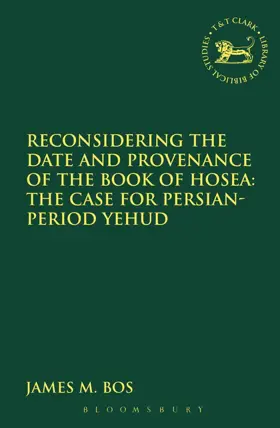

Reconsidering the Date and Provenance of the Book of Hosea: The Case for Persian-Period Yehud
in Library of Hebrew Bible/Old Testament Studies
Pages
208
Publisher
T&T Clark
Published
9/25/2014
ISBN-13
9780567657176
This study argues that the book of Hosea ought to be understood and read as a text that was composed in Persian-period Yehud rather than in eighth-century Israel. The author challenges the traditional scholarship and emphasizes that there is the evidence to suggest that the book should be viewed as a Judahite text - a book that was composed in the late sixth or early fifth century B.C.E. Bos provides an overview of the state of prophetic research, as well as a discussion of genre and the generation of prophetic books, linguistic dating and provenance; and a survey of Hosea research. Bos discusses various aspects of the book of Hosea that aim to prove his argument the book was composed in Persian-period Yehud - the anti-monarchical ideology of the book, the dual theme of ‘Exile' and ‘Return' which is consistent with the discourse found in other Judahite books dating to the sixth century; and the historiographical traditions.
- Table Of Contents
- Introduction
- Chapter 1: The Anti-Monarchical Ideology of the Book of Hosea as Evidence for a Persian-Period Date of Composition and Judahite Provenance
- Chapter 2: The Anti-Benjamin, Anti-Bethel, and Anti-Samaria Polemic in the Book of Hosea Read against the Background of the Early Persian Period
- Chapter 3: The Pervasiveness of the Judahite Dual Theme of Exile-Return in the Book of Hosea as Evidence for a Persian-Period Date
- Chapter 4: The Traditions of ‘Israel' in the Book of Hosea: Evidence for a Post-Monarchic Date and Judahite Provenance
- Bibliography
- Index